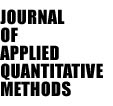 |
|
|||
Welcome letters
Microsoft Romania
Dear Professor Ivan,
I am very pleased to welcome the initiative for lunching Journal of Applied Quantitative Methods online publication.
As a representative of a software company, I would like to salute the interdisciplinary approach taken by the group of
respected professors and researchers to gather valuable contributions in this online journal.
Sharing our knowledge and experience has never been so demanding and in the same time possible like nowadays in the digital society.
I wish you all the success in positioning this publication as a place to meet for scientific and business community.
Sincerely yours,
Ovidiu Artopolescu
General Manager
Microsoft Romania
SIVECO Romania
Dear Professor,
Recently, we found out about the publishing of the Journal of Applied Quantitative Methods as an online journal.
As a company strongly involved in Research & Development, with many participations in national and international research projects,
SIVECO Romania welcomes the new journal and wishes it many and valuable issues.
We consider the domain of analysis based on quantitative methods as very modern and very interesting for our activity.
We will follow closely the evolution of your journal and hope to participate through our specialists with contributed papers.
Best regards,
Irina Socol
General Manager
SIVECO Romania
ASE Bucharest, Romania
Bucharest Academy of Economic Studies acknowledges the apparition of
Journal of Applied Quantitative Methods and sustains the efforts of the
scientific and editorial board to assure the high quality level that you have set as objective.
We have the certitude that all established objectives will become a reality.
The journal generous topic permits the participation of specialists from various
scientific research domains and allows the presentation of practice oriented papers with
an interdisciplinary character.
We wish you great success.
Ion Gh. Rosca
Rector
ASE Bucharest, Romania
Middle East Technical University, Ankara, Turkey
Quantitative methods have long been applied to scientific researches either to collect data conducive to carry out
the work or to reach meaningful conclusions in academic research. Therefore,
in areas from statistics to econometrics and from political arithmetic
to comparative history, the quantitative methods are used both as a research
technique and as a source of the study.

The quantitative method can be understood in two –but highly correlated- ways: The method is not only collecting
the data simply, but also an approach to understand the relations between the data, facts and events.
In the former, i.e. as a data-collecting technique, quantitative methods are the basic assistants
to social sciences and humanities. Humanities use quantitative methods in collecting, classifying,
evaluating and concluding their data. In this manner, the quantitative model is no more than one
of the functions of the social science approaches.
However, in the latter sense, i.e. as an approach of the research itself, the quantitative method is used
in humanities as well as social sciences in the formulation of the problematic of the research,
in creating and asking the questions, in grouping and sub-grouping the data to be used in the research,
in forming groups of data to constitute meaningful clusters of information, and in outlining
different series of data. Various clusters, many series, and different groups of data are reviewed,
evaluated, assessed, compared, contrasted and/or conciliated with one another through the established
procedures of the quantitative method to produce healthy conclusions out of the research.
Statistics always talk about probabilities, possibilities, and prospects; however, the quantitative method
in social sciences and humanities has already occupied an important locus among social science approaches
to produce certainties, specificities, explicitness, and definite conclusions.
Establishing mathematical models in social sciences, using series, sequences and cycles in
politics and economics, and comparing time series in history are ultimately helpful for the social scientists
to produce certain results in their works. Sometimes exhausting, sometimes laborious, but the
quantitative methods are now an inseparable part of social sciences.
The JAQM seems to have appeared very timely to fill up the vacuum in the field of quantitative methods.
With its objectives, academic structure, and elaborated procedures, it has the full capacity
to develop social science literature not only in Romania but also at the world scale.
The JAQM will also improve the quality of research in social sciences with its academic
procedures of selecting, evaluating and refereeing the articles to be published. These processes are
not only to contribute to our understanding of the matter under question, but also to help
the authors improve their works following the critiques of the experts of the field. The objectivity,
generality and independence of scientific research as the most significant qualities of
the quantitative method are adopted, therefore, as the basic tenets of the JAQM to provide the audience of
the quantitative methods with no more than the research results of scientific and academic works.
The JAQM is expected to contribute to the development of quality in quantitative methods, to the enhancement
of the methodological literature in social sciences as well as to provide new platforms for
the researchers in the field.
Dr. Recep Boztemur
Assoc. Professor of History
Chair, Middle East Studies
Middle East Technical University, Ankara, Turkey
